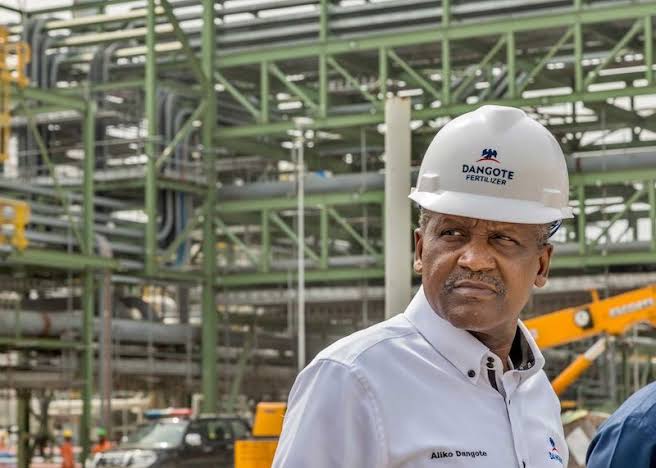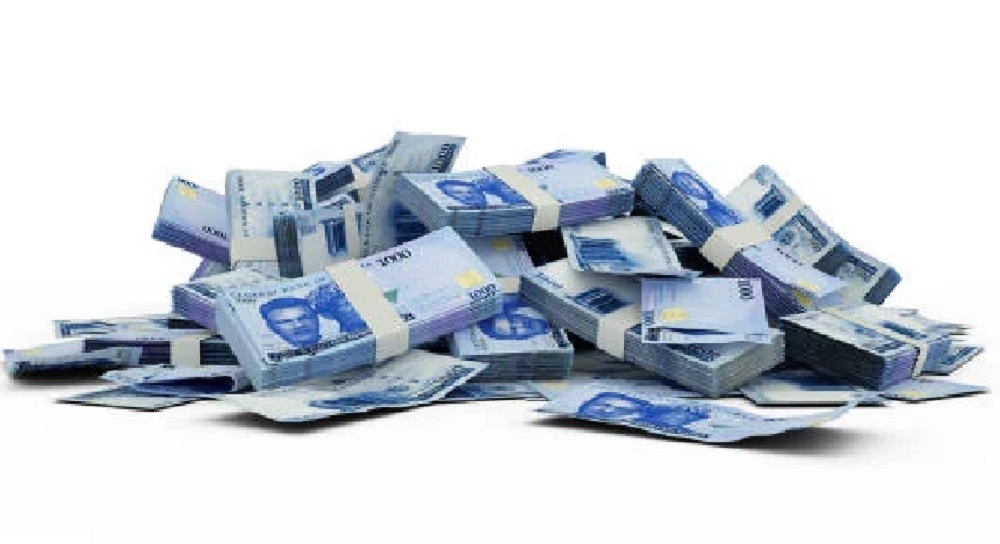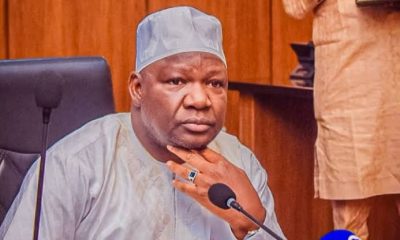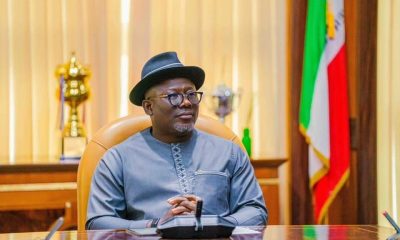Economy
Dangote tells NNPC, oil marketers to stop importing petrol, says refinery has enough

The President and Chief Executive of Dangote Industries Limited, Alhaji Aliko Dangote, says his refinery has the capacity to surpass the daily fuel needs of the country.
To this end, he urged the Nigerian National Petroleum Company Limited (NNPCL) and other fuel importers to stop importation.
The advice, if realised, is expected to save the country several billions of dollars in fuel importation and ease its corresponding strain on the naira.
Dangote disclosed this on Tuesday at the Villa after a meeting with President Bola Tinubu on the naira-for-crude policy.
The Minister of Finance, Wale Edun, and the Group CEO of the NNPCL, Mele Kyari, attended the meeting.
Dangote said he told the President that his refinery is ready to supply over 30 million litres daily with enough supply of crude.
He said the technical committee is doing the work and if there is any issue after that, the Minister of Finance and Coordinating Minister of the Economy will give guidance before it is escalated to the President.
According to him, “At full capacity we can even supply whatever is being consumed because what I estimated as our consumption is about 30-32 million litres which we can even start producing by next week.
“As we speak today. We have 500 million litres in our tanks. With that even if there is no production anywhere or no import that will take the country more than 12 days.
“So, we are more than ready and I am also putting my name on the line by telling Mr President that we will be able to supply the market 30 million per day and we are ramping up”.
Dangote added that, “On the streets what you have to understand is that we are producers. I have a refinery, and I am not in the business of retail.
“If I am in the business of retail you can hold me responsible, but what I am saying is that the retailers should please come forward and pick. If They don’t come forward and pick, what do you want me to do”.
He said he is expecting that the NNPCL and the marketers will stop importing, adding that he was losing money keeping product in tanks.
“I don’t know if you understand what it means to keep half a billion litres in our tanks, it is costing me money. Everyday if I am to collect money I can charge 32 percent in interest.
“That is what I am losing, and you are talking about 500 billion. If they come and collect then you will not see any queue in the filling stations”.
He said coming to the refinery to lift fuel should not be difficult since the NNPCL and other marketers have been doing that with importation.
“We have what it takes for them to come and collect, we are not retailers and we don’t have trucks, but we have a factory where we can load, come and pick and distribute and they have been doing that with importation.
“Since they have been doing that with importation I see no reason why they should not come and collect and distribute”, he stated.
Economy
OPay Scam Alerts advises Nigerians to remain vigilant against dubious activities

You are just seconds away from sending money – the offer sounds perfect, the seller seems trustworthy and the clock is ticking.
But just before you hit send, one of Nigeria’s leading financial institutions, OPay flashes a critical warning: “Caution – this account has been linked to suspicious activity.”
In that moment, the rush fades, your instincts kick in, and you realise you were on the brink of falling for a scam. One smart alert, one timely pause — and your hard-earned money stays exactly where it should: safe.
This is the power behind OPay’s multi-layered scam alert system — an Artificial Intelligence (AI)-driven, real-time defense network designed to detect and stop fraudulent transactions before they happen.
At the heart of it is a machine learning engine trained on thousands of scam patterns, user reports, flagged accounts, and unusual transaction behaviors. But OPay’s approach goes far beyond a single alert.
How OPay’s scam alert ecosystem works
Abnormal Transaction Pop-Up Reminders
When suspicious behavior is detected, OPay immediately interrupts the flow with a clear, targeted pop-up message. Every day, over 60,000 users receive these urgent fraud warnings — and thanks to that, 30,000 risky transactions are stopped in their tracks.
Intelligent Outbound Call Reminders
For higher-risk transactions, OPay activates a multi-channel response, sending warnings via SMS, email, app notifications, and even escalating to customer service calls. This proactive layer reaches more than 10,000 users daily, discouraging over 8,000 fraudulent transactions.
Interactive Q&A Verification
In cases where more context is needed, users are engaged with real-time Question & Answer (Q&A) prompts to understand the purpose of their transaction. If red flags are confirmed, the system presents a tailored warning or ends the transaction flow altogether. This feature alone helps deter over 46,000 scam attempts daily from the 50,000+ users who interact with it.
Together, these layers form a real-time scam detection and prevention engine that evolves with every user interaction. OPay’s system doesn’t just warn — it learns and adapts, constantly improving its accuracy and response time.
Many users don’t even know they’re in danger until OPay steps in. As one X user, @JAHS, shared: “OPay alerted me that I might be sending money to a scammer when I wanted to patronize an IG vendor. Stopped the transaction ASAP.”
These interventions are happening silently, daily – often before the user even suspects something is wrong.
OPay’s scam alert system is part of a broader philosophy: security is not just about technology – it’s about trust. From scam alerts to Face ID transaction verification, USSD instant account locking, the Large Transaction Shield, and automated callback alerts, every tool is designed to protect users in the moments they can’t predict.
As scams get more sophisticated, the future of financial safety depends on real-time prevention. And OPay isn’t waiting for fraud to happen — it’s stopping it in its tracks. Sometimes, the smartest financial decision you make… is the one OPay helped you avoid.
Economy
States face allocation cuts as agency demands N100bn monthly

The monthly statutory allocations to state governments from the federation account may decline in the coming months following an official request by the Nigeria Sovereign Investment Authority to boost the nation’s residual funds with the support of N100bn monthly.
The request, which was presented by the Managing Director and Chief Executive Officer of NSIA, Aminu Umar-Sadiq, is aimed at unlocking large-scale investments to drive Nigeria’s economic growth.
He made the request at the March revenue-sharing meeting of the Federation Account Allocation Committee held between April 14 and 15, 2025. Our correspondent obtained a copy of his presentation during the meeting on Friday.
Umar-Sadiq appealed to the committee, which includes state commissioners of finance, to consider and approve the request, with funding proposed to commence from the March FAAC allocation.
The presentation was titled, “Activating Residual Funding for the Nigeria Sovereign Investment Authority – Unlocking Opportunities for Large-Scale Investments to Drive Nigeria’s Economic Growth.”
According to the document, the NSIA is requesting a structured monthly disbursement of N100bn from Residual Funds—revenues in the Federation Account beyond projected hydrocarbon income—to establish a Naira-based investible capital pool.
The move, the authority says, will enhance its capacity to finance critical domestic infrastructure projects.
The MD said, “The funding would position the authority as a leading sovereign wealth fund globally, promoting responsible and strategic investments for Nigeria’s economic development and enhancing its threefold mandate to build a savings base for the country, enhance the development of infrastructure, and provide stabilisation support.”
He explained that residual funds are a legitimate source of funds transferred to the authority, provided that the derivation portion of the revenue allocation formula shall not be included as part of this funding.
Economy
More Nigerians to experience poverty by 2027 – World Bank

The World Bank’s latest Africa’s Pulse report has projects a grim future for Nigeria, with poverty expected to rise by 3.6 percentage points by 2027.
Released during the IMF and World Bank Spring Meetings in Washington, DC, the report cites Nigeria’s reliance on oil, economic fragility, and governance challenges as key drivers.
It highlights the country’s structural economic weaknesses, dependence on oil revenues, and national fragility as key barriers to meaningful poverty reduction.
“Poverty in resource-rich, fragile countries, including large economies like Nigeria and the Democratic Republic of Congo, is projected to increase by 3.6 percentage points between 2022 and 2027,” the report stated.
Despite recent growth in Nigeria’s non-oil sector during the last quarter of 2024, the World Bank warns that this progress is unlikely to translate into widespread poverty alleviation due to ongoing fiscal and institutional challenges.
The report emphasizes that Sub-Saharan Africa remains the world’s poorest region, with an overwhelming 80% of the globe’s 695 million extreme poor residing there in 2024.
Within the region, half of the 560 million extremely poor people were located in just four countries, including Nigeria.
In stark contrast, South Asia accounted for 8% of the world’s extremely poor population, East Asia and the Pacific 2%, the Middle East and North Africa 5%, and Latin America and the Caribbean 3%.
The World Bank attributes the rising poverty in Nigeria and similar economies to weakening oil prices and fragile governance structures, noting: “This follows a well-established pattern whereby resource wealth combined with fragility or conflict is associated with the highest poverty rates, averaging 46% in 2024, which is 13 percentage points higher than in non-fragile, resource-rich countries.”
Meanwhile, non-resource-rich countries in Africa are experiencing stronger economic growth and faster poverty reduction, buoyed by high agricultural commodity prices and more resilient fiscal policies.
To reverse Nigeria’s downward poverty trend, the World Bank recommends reforms that prioritize inclusive economic growth and stronger public financial management.
It calls on the government to focus on “improving fiscal management and building a stronger fiscal contract with citizens to promote inclusive economic development and long-term poverty alleviation.”
-

 News12 hours ago
News12 hours agoInsecurity: BUDA urges govt to quickly rescue Baruten from terrorists
-

 News17 hours ago
News17 hours agoJust in: Senator Natasha tenders satirical ‘apology’ to Akpabio
-

 News13 hours ago
News13 hours agoUNUSUAL! Without invitation, Police declared me wanted — Daughter of ABC Transport owner
-

 News8 hours ago
News8 hours agoBreaking: Late gospel singer Osinachi’s husband sentenced to death by hanging
-

 News10 hours ago
News10 hours agoWeeks to 2nd anniversary, Niger deputy gov, plans to resign, move out personal effects
-

 Metro19 hours ago
Metro19 hours ago‘My husband always makes love throughout the night until morning’ – Woman Wants Divorce
-

 News15 hours ago
News15 hours agoGov Oborevwori’s top aide suddenly resigns from govt
-

 Entertainment13 hours ago
Entertainment13 hours agoMy tongue slipped, Annie Macaulay apologizes after referring to Herself as ‘Idibia’ at Headies 2025






